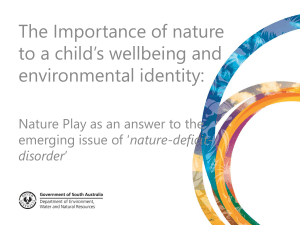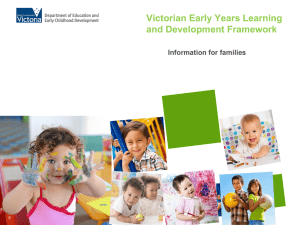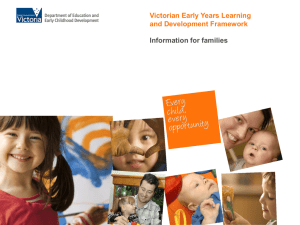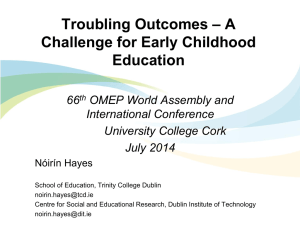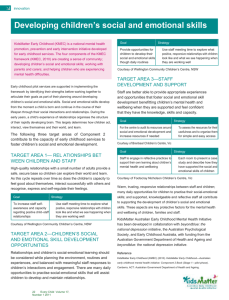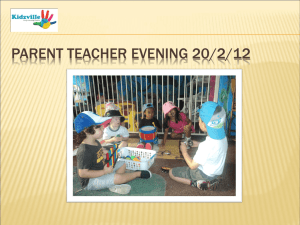Childcare and Early Childhood Learning
advertisement
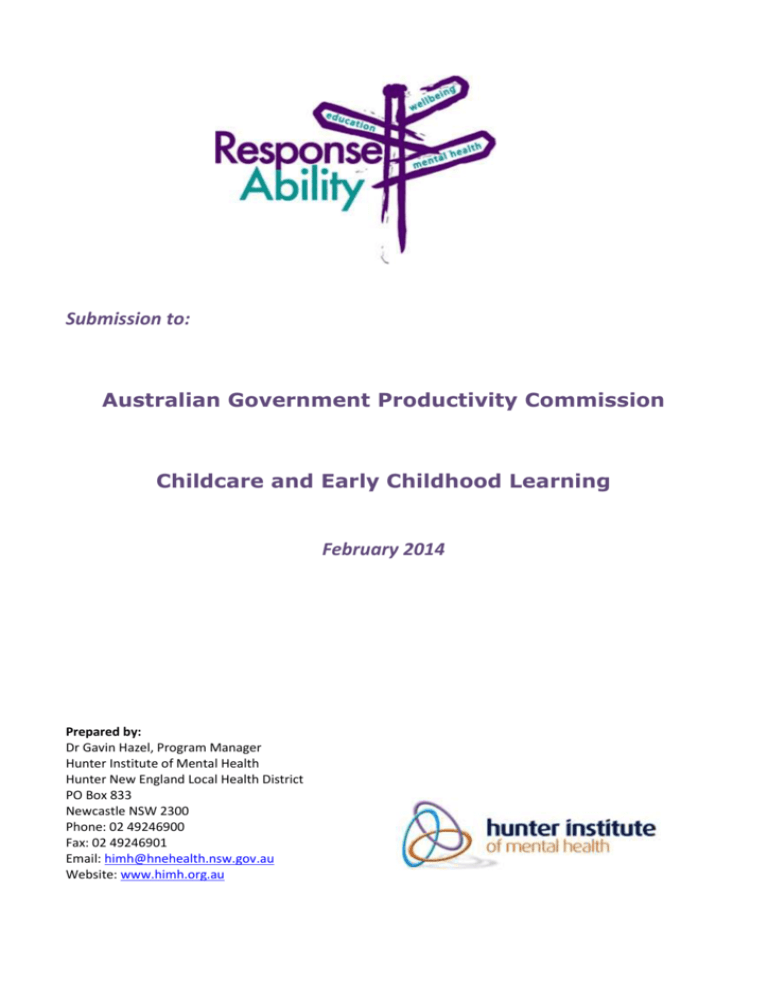
Submission to: Australian Government Productivity Commission Childcare and Early Childhood Learning February 2014 Prepared by: Dr Gavin Hazel, Program Manager Hunter Institute of Mental Health Hunter New England Local Health District PO Box 833 Newcastle NSW 2300 Phone: 02 49246900 Fax: 02 49246901 Email: himh@hnehealth.nsw.gov.au Website: www.himh.org.au Childcare and Early Childhood Learning – Public Inquiry Response Ability welcomes the opportunity to formally respond via submission to the Australian Government Productivity Commission’s Childcare and Early Childhood Development public inquiry. Response Ability – driving child and youth wellbeing The Response Ability National Mental Health Education Initiative (Response Ability) is Australia’s only custom designed evidence based intervention for the preparation of child and youth professionals to contribute, through their day-to-day practice, to children and young people’s mental health and social and emotional wellbeing nationally. Through its unique position in the pre-service tertiary environment, Response Ability is the first point of contact for trainee educators with the area of social and emotional wellbeing and lays the foundation for inservice programs they later encounter in early childhood and care centres. Response Ability aims to ensure a comprehensive response to child mental health and wellbeing that targets this key professional group and enables them to act from their first day in the workforce. Response Ability promotes as a central tenet the position that children’s services play a key role in promoting social and emotional wellbeing and competence in infants and young children and in contributing to mental health promotion and prevention. The early childhood education and care (ECEC) workforce also play an important role in early intervention when emotional, behavioural or mental health difficulties occur. Response Ability’s key objectives are: 1. Provide national leadership and direction on mental health promotion, mental ill-health prevention and early intervention for child and youth professions through the provision of evidence-based interventions. 2. Translate child and youth mental health promotion, mental ill-health prevention and early intervention evidence into sustainable and responsive interventions for the child and youth professions. 3. Build and support partnerships and collaborations with individuals, organisations and initiatives that focus on child and youth mental health promotion, mental ill-health prevention and early intervention. Response Ability provides a framework for communicating critical mental health principles, knowledge and skills to the tertiary education sector. The framework uses four key pillars: Evidence-based and sector appropriate resources and support; Consultation, collaboration and workforce capacity building; Changes to curriculum, competencies, policies, procedures and codes of professional practice; and National leadership. Response Ability is funded by the Commonwealth Department of Health and the program is managed by the Hunter Institute of Mental Health. For more information on Response Ability see: http://www.responseability.org/ Submission to the Productivity Commission Inquiry: Childcare and Early Childhood Learning Introduction The inquiry raises a number of issues that are of interest to Response Ability, in particular: The contribution that access to affordable, high quality childcare can make towards optimising children’s learning and development; The educational and social benefits that childcare and early learning services can provide; and The opportunities to improve connections and transitions across early childhood services and between early childhood services and school. In addition, Response Ability notes the following area as one of significance that could enhance the scope of the inquiry: The contribution to children’s social and emotional wellbeing that a workforce skilled and knowledgeable about mental health can make. A positive start in life helps children develop to their fullest. The benefits accrue to the whole society, through enhanced human capital and capability, increased productivity, greater social inclusion and reduced public expenditure in health, welfare and crime related to disadvantage over the life course. Healthy and happy children are more likely to become healthy and resilient adults who have more equal capacity, opportunity and resources to contribute to a cohesive and prosperous society 1. This positive start embraces a focus on the whole child – including their social and emotional development alongside cognitive and physical development. Response Ability supports the Council of Australian Governments statement above, emphasising the importance of the mental health and wellbeing of children for the welfare of the child, their family and the society in which they live. Evidence shows that an investment in the early years, by supporting the mental health and wellbeing of children, makes real differences to individuals and in turn contributes to building a prosperous and sustainable society for all Australians. This investment begins with the key professional group families and communities see as having response ability for children – early education and care workforce. The National Early Childhood Development Strategy 2 notes that a primary determinant of quality in early childhood development service provision is the workforce and Response Ability supports this professional group during their pre-service training by providing targeted evidence based resources specifically on social and emotional wellbeing. This focus on pre-service training ensures that early childhood education and care staff are ready to be at the frontline in services promoting mental health and wellbeing, preventing mental illness and providing early intervention for babies, children and families. Response Ability encourages the Commission to consider the inclusion of social and emotional wellbeing as an essential element when considering the scope of what constitutes ‘optimising children’s learning and development’. 1 Council of Australian Governments. (2009). Investing in the Early Years—A National Early Childhood Development Strategy. Canberra, ACT: Department of Education, Employment and Workplace Relations. 2 As above Submission to the Productivity Commission Inquiry: Childcare and Early Childhood Learning Early childhood development A vital and productive society with a prosperous and sustainable future is built on a foundation of healthy child development. Health in the earliest years— beginning with the future mother’s health before she becomes pregnant—lays the groundwork for a lifetime of wellbeing3. Early childhood development is embedded in the interaction between biological and environmental factors that children will experience in their earliest years. Healthy early childhood development, which includes the following dimensions: physical, social, emotional, and cognitive can strongly influence outcomes for physical and mental health throughout life. Conversely, children who experience a poorer start in life are more likely to develop behavioural, learning or mental health problems in childhood or adolescence and these can remain with them throughout their lives. Expert opinion and validating findings advocate that a healthy start in life greatly enhances the child’s later functioning in school, with their peers, in intimate relationships and within broader connections in the community and society4. In children, social and emotional development progresses alongside other areas of development in early childhood. The early environment, brain development, stress, attachment, social and emotional skills, selfregulation and relationships all have a bearing on the development of the child. These factors simultaneously influence the growth of social and emotional wellbeing and people’s mental health in childhood, as well as into adolescence and adulthood. Children's emotional development is built into the architecture of their brains. Emotional development begins early in life, is a critical aspect of the development of overall brain architecture, and has enormous consequences over the course of a lifetime. The foundations of social competence that are developed in the first five years are linked to emotional well-being and affect a child's later ability to functionally adapt in school and to form successful relationships throughout life5. As a society, if we have an expectation that affordable, high quality child care includes an awareness of children’s developmental needs and the ability to contribute positively to their social and emotional development, then there is both a need and an obligation to ensure that the ECEC workforce has the knowledge, skills and capacity to integrate this into their services. 3 Center on the Developing Child at Harvard University (2010). The Foundations of Lifelong Health Are Built in Early Childhood. Retrieved January 2014 from http://www.developingchild.harvard.edu 4 World Health Organisation (2004). Promoting mental health: Concepts, emerging evidence and practice. Summary Report. Geneva, Switzerland: WHO Publications 5 Tim Moore (2007). The Impact of Early Child Development and Experience on Later Outcomes. Footscray, Melbourne: Maribyrnong Early Years AEDI Forum Submission to the Productivity Commission Inquiry: Childcare and Early Childhood Learning Social and emotional wellbeing Response Ability acknowledges and welcomes the focus on optimising children’s learning and development in the Issues Paper and would like to highlight to the Commission the importance of including children’s social and emotional wellbeing within this. The term social and emotional wellbeing is essentially synonymous with the term mental health as defined by the World Health Organisation6: a state of wellbeing in which the individual realizes his or her own abilities, can cope with the normal stresses of life, can work productively and fruitfully and is able to make a contribution to his or her community. The term social and emotional wellbeing is generally preferred by Aboriginal and Torres Strait Islander people, as it reflects a holistic view of health and wellbeing. It is also a more term appropriate for some people from culturally and linguistically diverse backgrounds. Children and young people develop within the context of their relationships and environment. Their learning environments, peer interactions and relationships with caregivers can have a profound impact on their development and wellbeing. In turn, their social and emotional development and wellbeing can have a significant impact on their learning. Positive social and emotional development in early childhood is critical for children’s wellbeing and outcomes in later life. Developing a strong foundation of social and emotional skills in early childhood allows children to learn the behaviours, skills and values they will need to be functioning and contributing adults. Social and emotional wellbeing positively contributes to outcomes in later life including likelihood of higher level of education; attain and retain employment; build healthy and satisfying relationships; and being an active participant in the community. These positive outcomes benefit both individuals and the communities in which they live. To help build children’s social and emotional skills it is essential to provide high quality child care and early childhood learning. In short, children develop through their relationships with others. Therefore children’s services staff need to be knowledgeable in how to promote social and emotional wellbeing. Response Ability has established the CHILD framework which provides a practical guide to supporting children’s mental health and wellbeing in children’s services. CHILD is an evidence-based framework that summarises the practical strategies that teachers can use to support children and young peoples’ optimal social and emotional development and wellbeing, ultimately supporting their mental health. The domains of the CHILD framework are based on analysis of Australian and international research, public policy and expert opinion. 6 World Health Organisation. (2004). Promoting mental health: Concepts, emerging evidence and practice. Summary report. Geneva, Switzerland: WHO Publications. Submission to the Productivity Commission Inquiry: Childcare and Early Childhood Learning The CHILD acronym summarises and communicates the key principles of mental health promotion, prevention and early intervention, as they apply to people who work with young children. It also supports the five major learning outcomes of the Early Years Learning Framework: Children have a strong sense of identity Children are connected with and contribute to their world Children have a strong sense of wellbeing Children are confident and involved learners Children are effective communicators7 Figure 1: CHILD Framework Internationally and nationally, there is recognition that early childhood development is critical for mental health and wellbeing and that these disciplines and areas of research and policy must increasingly intersect. In Australia, mental health and early childhood care and education are two areas in which governments are progressing important work, based on current evidence and the recognised need for action. In this submission, Response Ability has highlighted the opportunities for children’s services staff to contribute positively to children’s social and emotional development, their wellbeing, and their longer-term mental health outcomes. While the evidence base is still emerging, and while new research will continue in this area, it seems that there is already clear evidence that investing in the early years has the potential to bring about great benefits. 7 Council of Australian Governments. (2009). Belonging, being and becoming: The early years learning framework for Australia. Canberra, ACT: Department of Education, Employment and Workplace Relations. Submission to the Productivity Commission Inquiry: Childcare and Early Childhood Learning Children, families and indeed whole communities stand to benefit from a systematic focus to integrate these principles into the way we care for our children. We can promote children’s wellbeing today and contribute to better health, mental health and learning outcomes for them as they progress to adolescence and adulthood. Summary Response Ability is pleased to contribute this submission on the Issues Paper of the Productivity Commission Childcare and Early Childhood Development. In review, we know that disruption of healthy development, reduced wellbeing, and mental ill-health lead to poor outcomes learning, behaviour, and health. The Center on the Developing Child at Harvard University note that these types of outcomes incur an enormous cost to society and individuals - from failure to complete school, greater probability of contact with the criminal justice system, poorer overall health outcomes, increased risk of substance abuse, and reduced life expectancy8. Professional groups who are consistently engaged with children and families can assist in preventing or mitigating the consequences of mental health problems by buffering young children from serious threats to their wellbeing9. These professional groups can build the “social and emotional capacities of infants and children by supporting predictably available, adequately sensitive and responsive care giving”.10 Ensuring the provision of a healthy, safe, and supportive environment for all young children requires responsible management of the available workforce. It is critical that we act on existing scientific knowledge and ‘close the gap between what is known and what is done’. It is equally important to seek out new and more effective workforce strategies to support families and expand opportunities for children. Taken together, these priority areas reinforce the importance of early childhood workforce strategies that consider the wellbeing of children and parents as central to the work of childcare and early childhood learning11. By targeting a common core of capacities12 that are essential to support vulnerable children and families we can simultaneously strengthen both the workforce and the community. If we want to achieve better outcomes for children, we must continue to strive for high standards for quality care and learning. One promising pathway to achieve this is to focus on fostering skills, during their professional preparation, in key professions that will allow them to become (or to be) better enablers of children’s mental health. Appropriately equipped early childhood professionals can actively work to strengthen children and families so that they are more likely to possess the tools they need to achieve self-sufficiency, as well as healthy, secure lives.13 Response Ability is willing to contribute further to this inquiry or supply further information as the Commission sees fit. 8 Center on the Developing Child at Harvard University (2010). The foundations of lifelong health are built in early childhood. http://www.developingchild.harvard.edu 9 National Scientific Council on the Developing Child (2007) The science of early childhood development. http://www.developingchild.net 10 AAIMHI and ARACY (2013). Halving rates of mental illness in Australia – by starting at birth. 11 Shonkoff, J.P. (2009). Mobilizing science to revitalize early childhood policy. Issues in Science and Technology, Fall 2009. 12 Center on the Developing Child at Harvard University (2012). In Brief - Executive function: Skills for life and learning. . http://www.developingchild.harvard.edu 13 Center on the Developing Child at Harvard University (2010). The foundations of lifelong health are built in early childhood. http://www.developingchild.harvard.edu Submission to the Productivity Commission Inquiry: Childcare and Early Childhood Learning Contact For further information please contact: Dr Gavin Hazel – (02) 4924 6945 Submission to the Productivity Commission Inquiry: Childcare and Early Childhood Learning

